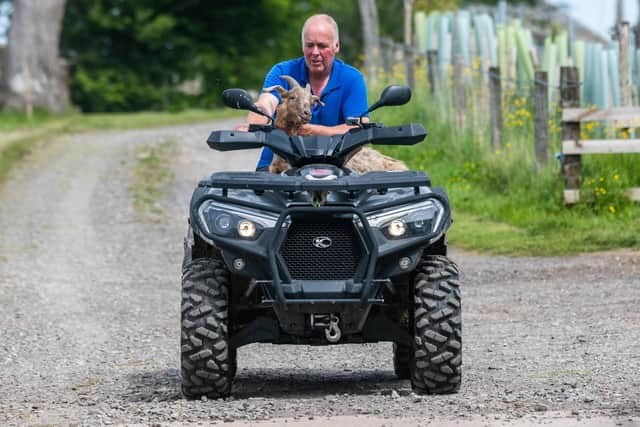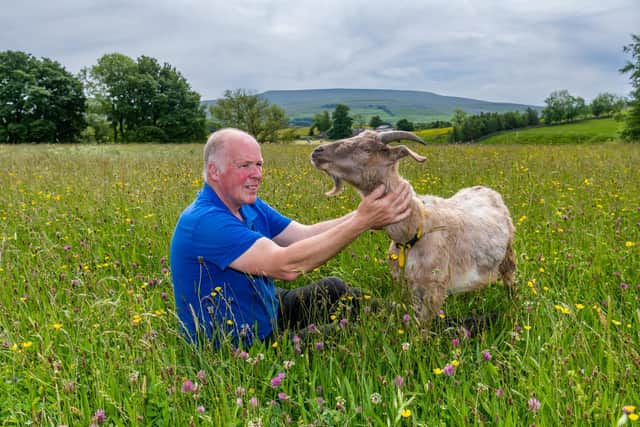Farm of the Week: Goat herd that keeps Dales farm afloat at 1,000ft above sea level - without relying on subsidies
Frank Hunter farms at Piper Hole Farm in Ravenstonedale, officially in Cumbria but also officially under the Yorkshire Dales National Park jurisdiction. It is his goat herd’s ability to produce excellent quality milk from the hills that has seen him venture successfully into award-winning cheese production.
Frank said his soil management, production of wildflower meadows, the sheep and the goats all play integral parts in Piper Hole’s future.
Advertisement
Hide AdAdvertisement
Hide Ad“Goats are our main sector now. We have about 250-head at any one time and have around 130 breeding goats. We are presently milking around 60. We concentrate on Saanen and British Alpine breeds with goat’s milk produced into cheese for our own brand and an organic brand and with goat’s meat that we sell locally and at farmers markets in Orton and Brough.


“There’s no one thing that works on its own and we can say let’s stick with that, but we don’t rely on any form of subsidies. We challenged ourselves to make back the monies we would have been receiving from the Basic Payment Scheme by selling our milk and having our own cheese for sale and we have achieved that.
“Our goats provide 1.8 to 2 litres per goat per day over their 300-day lactation period and we work them like cows giving them a rest after that time. They will normally produce milk for us up to six to eight lactations. Their prolificacy is around 1.5 kids per nanny. I treat them as athletes that need looking after to keep performing well.”
Frank said that his goat herd works similar to a sheep flock with replacements bred from those already used to the hills.
Advertisement
Hide AdAdvertisement
Hide Ad“It’s the best way forward. If they are bred on to the farm they are used to the poor conditions we experience. If we were buying a milking goat from an intensive dairy herd it wouldn’t work up here because it wouldn’t be used to our weather.”


Finding and keeping new markets has brought the farm TV fame on several country and farm-based shows since having taken on goats and rejigging the livestock species, breeds and numbers having taken on the farm 18 years ago. Frank said the goat herd’s potency as the focus of the farm’s main earnings is down to a combination of factors.
“We don’t get the same volume of milk per head that other goat herds may achieve but we have found a significant niche in both goat meat and goat’s dairy produce and that is the health benefits.
“Our eating and drinking habits no longer purely revolve around bacon and eggs, roast beef and fish and chips anymore. There are now so many world cuisines and we can sell goat meat very well to a receptive general public and to cafés and restaurants.
Advertisement
Hide AdAdvertisement
Hide Ad“We also now know that the quality of the milk produced by our goats is much easier to work with for making into cheese. That’s down to the simple fact that we’ve based our herd on a largely forage based diet rather than intensive feeding where concentrates are used.
“Our milk goes into Leagram Organic Dairy who produce their own label and our label cheeses. It is particularly appropriate for lactose intolerant customers due to its constitution. We were recently a finalist in a North West Family Business Awards for our cheese, and Faye Kitching of Leagram brought back a Bronze award in last autumn’s International Cheese Awards for Piper Hole Goat Farm cheese.”
Frank said that going back to his roots has proved successful and that he is carrying on a tradition of holistic management of the farm.
“I was born on the farm next door. Piper Hole was my godmother Juliet Frankland’s farm and she was a doctor in microbiology. I spent a lot of time with her and my interest in the ground, the soil and plants being looked after correctly stemmed from Juliet. I took an Open University degree in Earth Science earning my BSc.
Advertisement
Hide AdAdvertisement
Hide Ad“I couldn’t afford time away from farming. I’d started the degree course at 18, was married to Ruth at 19, we had two children in my early twenties and so I had to study when I could, in between working as a dairyman for farms in Cumbria. That way you had a tied cottage to the job.
“My parents had moved to another farm when I was young. I’d grown up in the Kendal area. I’d had 15 years as a dairyman and had then started a contract shepherding business and looking after farms for farmers when either ill, away or retired.
“We came to Piper Hole in 2004, took on the full tenancy from Juliet in 2010 and we ended up buying the farm outright in 2016. It runs to 120 acres of grassland and 400 acres of common land.”
It is attention to detail over soil condition and such as wildflower meadows over many generations that Frank believes has made their cheese and goat’s meat as tasty as it all is today.
Advertisement
Hide AdAdvertisement
Hide Ad“Everything produced on a farm stems from the soil. It provides everything. What type of plants you grow, how they perform and how that affects your farming.
“Our herbal meadows have over 80 plant species and play an important role. They mean that we don’t have to put much down our animals’ throats in terms of off the counter medicines.
“The goats are also good land managers. They will eat the rushes and thistles. The sheep will eat the grass.
“Rough Fells have been replaced by Border Leicesters which are good converters of our grass into meat. We sell at Kirkby Stephen and Bentham marts.
Advertisement
Hide AdAdvertisement
Hide Ad“Border Leicesters are hardy. Rough Fells weren’t wanted at market and we now have a flock of 130 breeding ewes that will soon be 100 per cent Border Leicester having originally crossed with the Rough Fell.”
